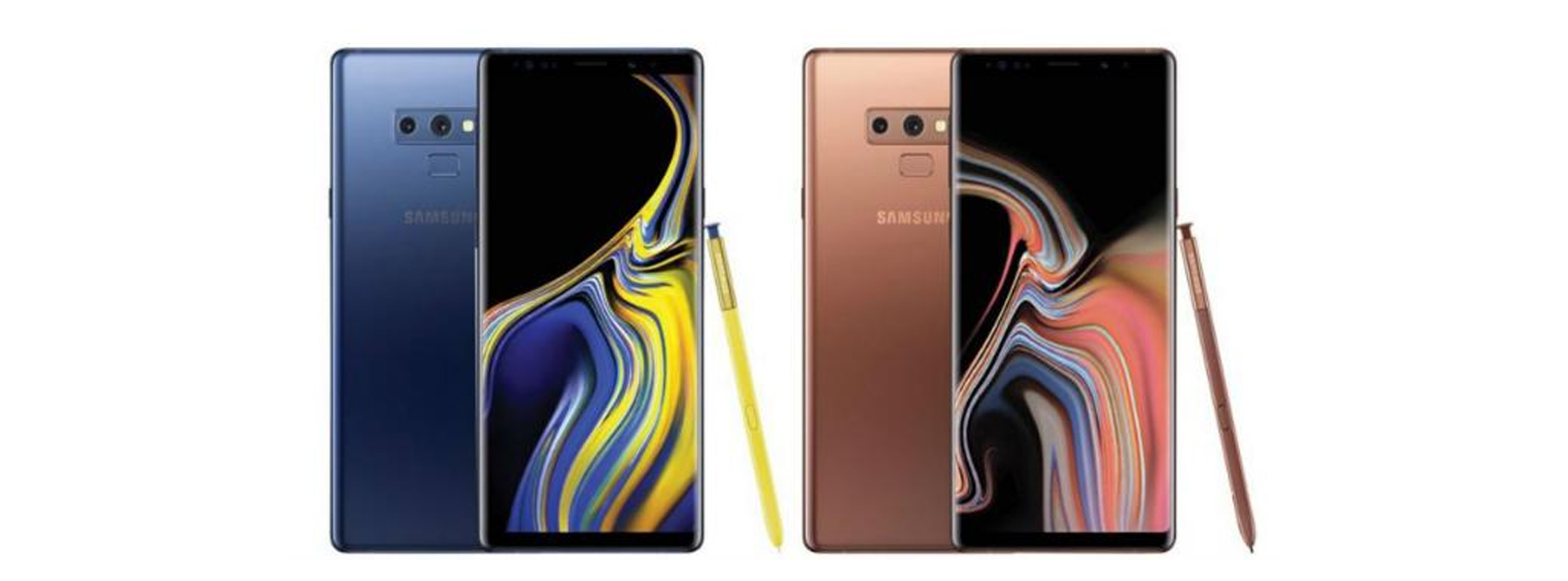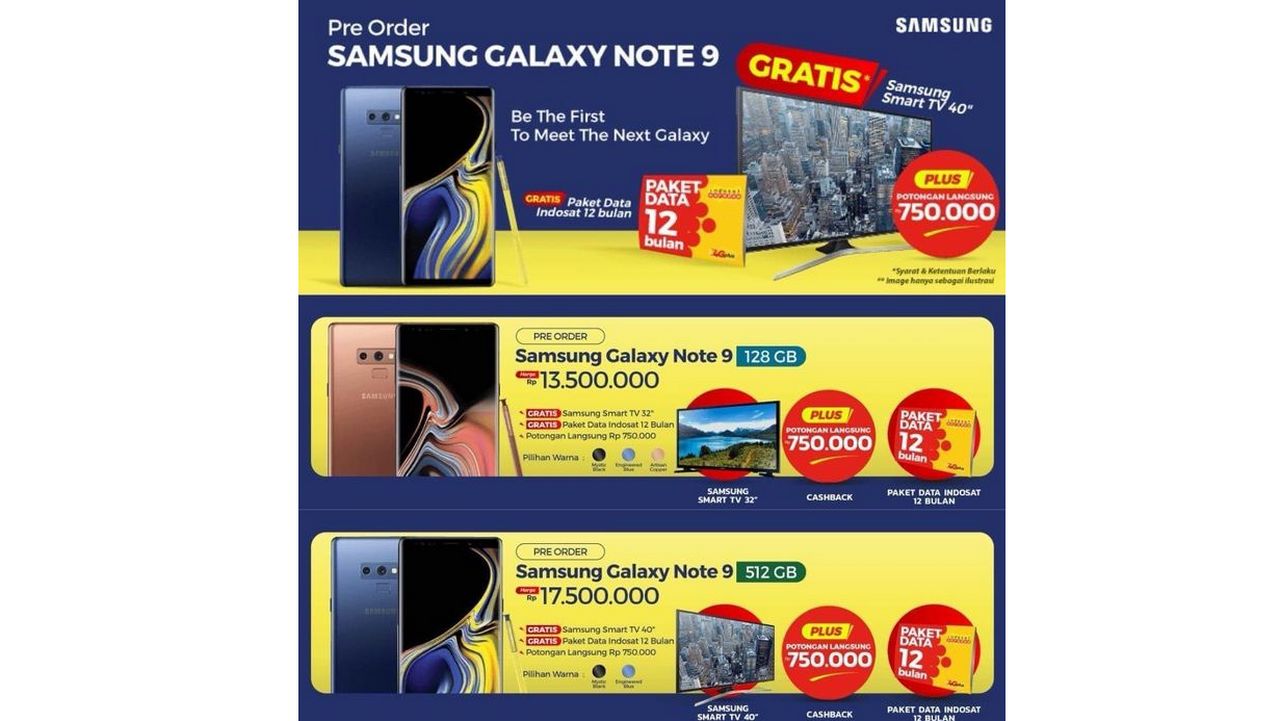News
Everything You Need To Know About Samsung Galaxy Note 9

We are just 10 days away from the most anticipated launch of Samsung Galaxy Note 9, the latest Samsung smartphone.
Ever since the news dropped regarding the launch of the next flagship of Samsung, a lot of rumours are doing the rounds. As the launch event of Samsung Galaxy Note 9 approaches, the excitement levels are only getting intense by the minute. The event is all set to kick start on 9 August in Brooklyn, New York City. With each passing day, a lot of speculations are coming in and various leaked images are doing the rounds.
Apart from leaked images, we are flooded with a wide range of new features too!
According to the latest leaks, Samsung Galaxy Note 9 comes with a base model of 128 GB of storage. It appears that Samsung will only offer two variants of the Galaxy Note 9 this year, with 128 GB and 512 GB of onboard storage. As per the report by Sammobile, a new leaked poster for buyers based in Indonesia revealed the price and designs of the phone.

According to the leaked images, the Galaxy Note 9 will arrive in Indonesia in three colour variants including artisan copper, engineered blue and mystic black. These images also suggest that in Indonesia, both the 128GB and 512GB models of the Galaxy Note 9 will come with a free Samsung TVs as pre order gifts. Whether or not these images are true, only time will tell! The Galaxy Note 9 will have a massive 4,000 mAh battery, according to Brazil’s National Telecommunications Agency ‘ANATEL.’ This breathtaking battery of 4k mAh lasts for two days and could playback 25 hours of non stop video! Not only that but this sassy phone would display with maximum brightness on a single charge. Is that not stunning?
As far as the prices are concerned, according to a source, the 128 GB in built storage model of the Galaxy Note 9 will be priced at IDR. 13,500,000 (Rs. 64,400) in Indonesia. The 512 GB variant of the smartphone’s price will be significantly higher at IDR. 17,500,000 (Rs. 83,500). However, there is no mention of a 64GB or a 256GB model of the handset. The phone will come with a 6.4 inches high resolution OLED screen and consists of Samsung’s customised software, Android Oreo. The Note 9 will also sport dual camera system on the rear, with one of the cameras supporting optical zoom.
Samsung Galaxy Note 9 will be available in a wide range of vibrant colours including black, silver, lilac purple, brown and coral blue.
Flipkart also released a teaser in which it hints Samsung Galaxy Note 9 to launch in India on August 9.
The Samsung Galaxy Note is a series of high end Android based smartphones and tablets, developed by Samsung Electronics. All the Galaxy Note models ship with a stylus pen and are incorporated with a pressure sensitive Wacom digitizer. These models also include software features that are oriented towards the stylus and the devices’ large screens, such as note taking and digital scrapbooking apps and split screen multitasking. The first ever launch of this series took place at IFA Berlin in 2011.
For more updates, follow StartupStories.
Funding
Dazzl Raises $3.2M Seed Funding Led by OYO’s Ritesh Agarwal for AI Skincare Expansion

Bengaluru, January 13, 2026 Dazzl, the D2C beauty startup revolutionizing AI personalized skincare India, secured $3.2 million in seed funding led by OYO founder Ritesh Agarwal’s venture arm. Co-investors include Snapdeal’s Rohit Bansal and Fireside Ventures, valuing Dazzl at $15 million post-money. Founded in 2024 by IIT alumni Priya Singh and Arjun Mehta, the app uses smartphone scans for custom serums, boasting 50,000+ users and ₹5 crore ARR amid India’s $25 billion beauty market surge.
Ritesh Agarwal praised Dazzl’s tech: “Personalization is beauty’s future, like OYO’s guest model.” Funds target R&D for 100+ skin profiles, Gujarat manufacturing under PLI, Instagram/Nykaa campaigns, and 50 hires. In a 20% YoY growing sector (Redseer 2025), Dazzl edges Mamaearth and Plum with 95% AI precision, 90% natural formulas, ₹499 kits, 65% retention (vs. 40% avg), and viral TikTok traction in 10 cities.
D2C beauty startup Dazzl tackles regulations via FSSAI compliance, eyeing $10B e-commerce beauty by 2028 and MENA exports. Q2 haircare launches and Series A loom, with Agarwal’s backing signaling unicorn potential for sustainable beauty products India. Dazzl blends AI with clean beauty for 500M+ consumers.
News
Google Launches Startup Hub in Hyderabad to Boost India’s Innovation Ecosystem

Google has launched the Google Startup Hub Hyderabad, a major step in strengthening India’s dynamic startup ecosystem. This new initiative aims to empower entrepreneurs, innovators, and developers by giving them access to Google’s global expertise, mentoring programs, and advanced cloud technology. The hub reflects Google’s mission to fuel India’s digital transformation and promote innovation through the Google for Startups program.
Located in the heart of one of India’s top tech cities, the Google Startup Hub in Hyderabad will host mentorship sessions, training workshops, and networking events designed for early-stage startups. Founders will receive Google Cloud credits, expert guidance in AI, product development, and business scaling, and opportunities to collaborate with Google’s global mentors and investors. This ecosystem aims to help Indian startups grow faster and compete globally.
With Hyderabad already home to tech giants like Google, Microsoft, and Amazon, the launch of the Google Startup Hub Hyderabad further cements the city’s position as a leading innovation and technology hub in India. Backed by a strong talent pool and robust infrastructure, this hub is set to become a growth engine for next-generation startups, driving innovation from India to global markets.
News
BMW’s New Logo Debuts Subtly on the All-Electric iX3: A Modern Evolution

BMW quietly debuted its new logo on the all-electric iX3, marking a significant yet understated shift in the brand’s design direction for 2025. The updated emblem retains the classic roundel and Bavarian blue-and-white colors, but sharp-eyed enthusiasts noticed subtle refinements: the inner chrome ring has been removed, dividing lines between blue and white are gone, and the logo now features a contemporary satin matte black background with slimmer “BMW” lettering. These enhancements showcase BMW’s embrace of modern minimalism while reinforcing their commitment to premium aesthetics and the innovative Neue Klasse philosophy for future electric vehicles.
Unlike rival automakers that reveal dramatic logo changes, BMW’s refresh is evolutionary and respectful of tradition. The new badge ditches decorative chrome and blue borders associated with earlier electric models, resulting in a flatter, more digital-friendly design that mirrors recent branding seen in BMW’s digital communications. Appearing first on the iX3’s nose, steering wheel, and hub caps, this updated identity will gradually be adopted across all BMW models—both electric and combustion—signaling a unified brand language for years to come.
BMW’s strategic logo update represents more than just aesthetic reinvention—it underscores the brand’s dedication to future-ready mobility, design continuity, and a premium EV experience. As the new roundel begins rolling out on upcoming BMW vehicles, it stands as a testament to the automaker’s depth of detail and thoughtful evolution, offering subtle distinction for keen observers and affirming BMW’s iconic status in the ever-changing automotive landscape.












J88
November 7, 2025 at 8:54 pm
Đến với J88, bạn sẽ được trải nghiệm dịch vụ cá cược chuyên nghiệp cùng hàng ngàn sự kiện khuyến mãi độc quyền.
站群程序
November 10, 2025 at 9:13 am
搭载智能站群程序,自动化搭建与管理,为SEO项目提供核心驱动力。站群程序
MM88
November 10, 2025 at 5:04 pm
Với giao diện mượt mà và ưu đãi hấp dẫn, MM88 là lựa chọn lý tưởng cho các tín đồ giải trí trực tuyến.
谷歌站群
November 13, 2025 at 12:00 am
专业构建与管理谷歌站群网络,助力品牌实现全域流量的强势增长。谷歌站群
GO88
November 16, 2025 at 1:24 pm
Tham gia cộng đồng game thủ tại Go88 để trải nghiệm các trò chơi bài, poker phổ biến nhất hiện nay.
Kuwin
November 22, 2025 at 6:46 pm
kuwin sở hữu kho game đa dạng từ slot đến trò chơi bài đổi thưởng, mang đến cho bạn những giây phút giải trí tuyệt vời.
iwin
November 25, 2025 at 9:13 am
iwin – nền tảng game bài đổi thưởng uy tín, nơi bạn có thể thử vận may và tận hưởng nhiều tựa game hấp
MM88
November 30, 2025 at 5:01 pm
Khám phá thế giới giải trí trực tuyến đỉnh cao tại MM88, nơi mang đến những trải nghiệm cá cược thể thao và casino sống động.